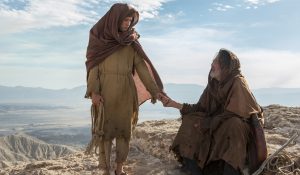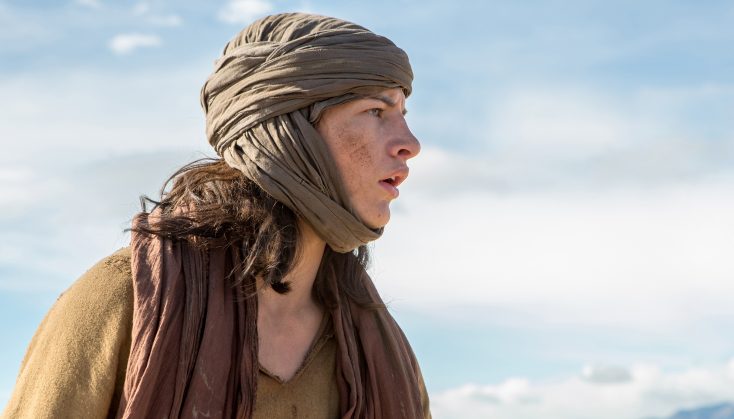
(l to r) Tye Sheridan stars as ‘Son’ and Ciarán Hinds as ‘Father’ in the imagined chapter of Jesus’ forty days of fasting and praying, LAST DAYS IN THE DESERT. ©Broad Green Pictures. CR: Gilles Mingasson / Broad Green Pictures
By ANGELA DAWSON
Front Row Features
HOLLYWOOD—Much like the nomadic character he plays in the biblically inspired family drama “Last Days in the Desert,” emerging actor Tye Sheridan grew up outdoors relying on his imagination and physical skills unlike many of his contemporaries, who spent their early years plopped in front of the TV set or playing videogames.
“We were out fishing and hunting, playing sports and talking to folks,” recalls the 19-year-old. “It was a very traditional (upbringing).”
Then, on a lark, the bright-eyed Texas native auditioned for a part in a movie, and was selected from thousands of other boys to appear in Terrence Malick’s “The Tree of Life” as one of Brad Pitt’s and Jessica Chastain’s sons. Since then, Sheridan has been cast alongside Matthew McConaughey in Jeff Nichols’ “Mud” and with Nicolas Cage in David Gordon Green’s “Joe.”
In “Last Days in the Desert,” a fictional account of what may have transpired during Jesus Christ’s 40 days of prayer and fasting in the desert, he plays a teenager at odds with his father and fearful of his mother’s impending death. The family lives on a remote mountaintop surviving off the land with a small herd of sheep. Alone, with the exception of his parents, the boy dreams of leaving the harsh desert life for a distant town where he can make something of his life, but his overbearing father (Ciaran Hinds) wants him to stay put. One day a stranger shows up who turns out to be more than just another holy man on a spiritual quest. That man (Ewan McGregor) is having a father crisis of his own. Aware of his calling and pending sacrifice, he tries but can’t communicate with God. Meanwhile, the devil (also played by McGregor) taunts and tempts Christ in his most vulnerable state and wagers that he cannot save this human family in conflict. The film also stars Israeli actress Ayelet Zurer, who plays the boy’s dying mother.
The drama was written and directed by Rodrigo Garcia, who previously helmed the Academy Award-nominated feature “Albert Nobbs” and served as executive producer and first season showrunner of the HBO series “In Treatment.” Garcia saw Sheridan’s previous film performances and says he knew the boy had the grace and presence to play a vital role in this drama.
Working on a crossword puzzle when a stranger enters the room, Sheridan is indeed clearly poised and delivers thoughtful answers to questions about his life and career. While most of his roles thus far have been in smaller, independent films, the young actor is about to be catapulted into another level of fame as he stars as the young mutant Cyclops/Scott Summers in Fox’s upcoming fantasy blockbuster “X-Men: Apocalypse.”
Q: Aside from the holy man element, “Last Days in the Desert” is about the dynamics of this nuclear family.
Sheridan: It was never a “Jesus movie” or a movie about religion or a movie about Christianity. It isn’t about that. It’s about a relationship between a father and a son and a man encountering a family, and his own relationship with his father. So there’s this parallel between two generations: between Ewan’s character and his father and my character and my father.
Q: Does the coming-of-age story parallel anything in terms of your own transformation from childhood to adult?
Sheridan: Yeah. The most intriguing parallel to me between my personal life and where I was when I shot the film is they’re both coming of age and trying to figure out what it means to be a young man, to become an adult and to take on these responsibilities of reaching your goals and meeting your desires but at the same time providing for your family, keeping them happy and keeping the relationship pure. I think (my character) is very rebellious in his nature and the relationship with my father in the film is very abrasive. They have different conflicting ideas about one man’s land and their destiny and fate. The movie’s very much about destiny and fate, faith and what it means to be a man and be a son. It explores all of those things.
Q: What do you suppose happens to the boy after the movie ends?
Sheridan: I don’t know. (He smiles.) That’s for you to watch and decide.
Q: Was it clear to you from a young age what your path in life was going to be?
Sheridan: I don’t know. I was so young when I started to dip my toes into this industry. It all happened so randomly. I was going to a small public school in Texas. There were some casting directors that came by who were casting for a new movie, and it happened to be Terrence Malick’s “Tree of Life.” They ended up recruiting 10,000 kids to come to these auditions. I went to an audition and kept getting called back and then they ended up casting me. I was like, “Holy ****! I never thought that would happen.” I was so young that I don’t think I had an opportunity to think about what I wanted to do or what I wanted to do as a career. I didn’t know who I was; I still don’t know who I am.
Q: How old were you when you auditioned for “The Tree of Life?”
Sheridan: Eleven or 12 years old.
Q: In making that film, did that convince you that you wanted to be a professional actor?
Sheridan: I loved that experience; I made a lot of great relationships. When I was 14 or 15 I worked on “Joe” and “Mud,” these two southern gothics. It wasn’t until then that I developed a passion for cinema. I remember Nicolas Cage said to me, “You remind me of James Dean. Do you know his or Marlon Brando’s early stuff?” And I said, “I kind of know who they are.” He asked me if I’d seen “Rebel Without a Cause” or “East of Eden,” and I said “no.” So the next day, he brought me some DVDs: “Rebel Without a Cause,” “One the Waterfront,” “A Streetcar Named Desire.”
Q: “Giant?”
Sheridan: No. I still haven’t seen “Giant.” Did you ever see “A Place in the Sun,” with Montgomery Clift and Elizabeth Taylor? That was the first time I’d experienced real cinema. I’d seen a lot of movies but I’d never put much thought into filmmaking. After having these few experiences, that’s when I really started to fall in love with the craft. Then I started to plunge deeper into filmmaking and what it means to be a filmmaker. It’s from asking questions of great people I’ve been lucky to work with. Now it’s like one of the only things I care about. (He chuckles.)
Q: Having worked with Terrence Malick, Bryan Singer and Rodrigo Garcia, would you like to become a filmmaker someday?
Sheridan: Yeah, I’d like to eventually gravitate towards that. As long as I’m learning and working on good projects, I like it. I’m sure it will be something I’ll do for the majority of my career. Who knows? It might be off and on. But eventually I’d like to venture out and start writing my own stuff.
Q: When you were cast in “Last Days in the Desert,” did you know you’d be shooting in Southern California?
Sheridan: They were talking about filming this in Israel. But Chivo (Lubezki, the cinematographer) said, “We can shoot it for a shorter time in the desert here.” So we shot it in Joshua Tree. But it definitely feels foreign. It almost feels like Mars.
Q: Did you feel a certain sense of spirituality while shooting this in the California desert?
Sheridan: Yeah, sure. The isolation alone was enough to motivate a period or phase of self-reflection. I was again recently working in the desert and there’s something special about it. You can be in the desert all day and not see another soul. What I’ve realized is when life starts to move so fast and you start to lose a sense of who you are, almost, because you’re doing so many things and you’re hanging around so many people, you’ve got to remember the things that you like.
So I think taking some time to be by yourself, being in your own company is such a great way to learn, especially after being overexposed to so many people. It’s nice to just settle down and be with yourself.
Q: With “X-Men: Apocalypse” coming out soon, do you worry about the loss of privacy you might experience along with the fame that will come with that?
Sheridan: I don’t know. I’m such a newbie in this franchise. I don’t know how people are going to receive my involvement in it. I hope it goes well. I don’t know what to expect because I’ve never been a part of a movie of this magnitude. I’m honored and grateful to have been a part of it because I think it’s one of the rare franchises out there that does a good job of balancing the story with exciting entertainment because there are so many movies of its type that don’t. “X-Men” is a rare, unique and special franchise.
Q: This is an election year and the first time you’ll be old enough to vote? Are you going to take part in the electoral process?
Sheridan: I haven’t had enough time to follow what’s been going on in politics now. But I’m aware enough and I totally plan to vote. I’m aware of what’s going on in our country. I know every vote counts but I don’t feel I have a valid enough … I’m just going to stop right there.
Q: What are you doing next?
Sheridan: Just taking a couple of meetings and waiting to see.





